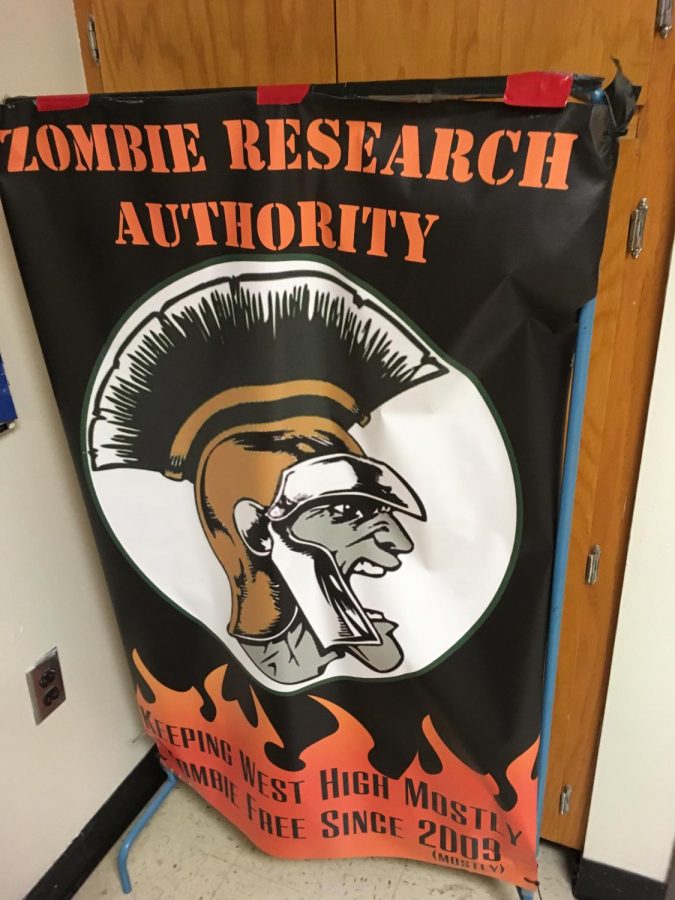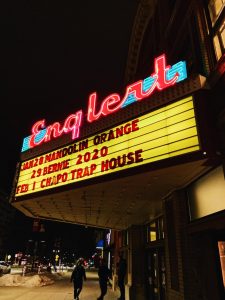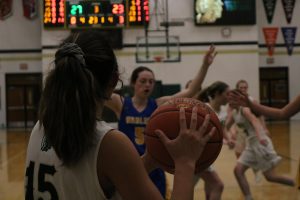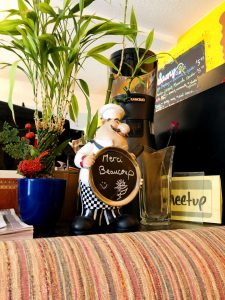Role playing, life saving, and zombies
What West High’s Zombie Research Authority is really about.
“We found you half beaten to death.”
“You can keep your weapons on you.”
“If it’s a danger to keep you here, we won’t keep you here.”
These are just a few of the comments that traversed the room at the start of the Zombie Research Authority club’s recent meeting.
If a person were simply to waltz into the mannequin-head laden classroom midway through a ZRA meeting, they might hear members discussing anything from throwing straws to tin-foil knuckles, to a particular character named Snuffles’ with a nose the length of one foot. The somewhat bizarre atmosphere and otherworldly topics of discussion can make it easy for newcomers to be thrown for a loop, but the ZRA is much more than what first meets the eye.
The ZRA is a club that has existed at West High School since 2009, but few people actually have an accurate idea or any real knowledge as to what exactly it is they do. Many people see the Zombie Research Authority Club banner at the club fair and give the table a wide berth, wondering “What could they possibly be doing in that club?” Much of the time, they choose to ignore it.
“I didn’t wanna go to it the first two years,” said member Gabriel Alvarado ‘19, “but I’ve been trying a lot of new stuff, and it’s actually pretty fun.”
This initial hesitation and uncertainty about the club is common among many of the current members.
Even the club’s co-president, Madi Wehmeyer ‘19, admits that she only attended her first meeting freshman year at a friend’s suggestion. Upon arriving though, she realized that it was actually pretty fun, and now leads the club. However, they agree that though they may have been reluctant at first, they now genuinely enjoy attending and participating in the club.
The club’s activities generally range from role-play to video games to zombie tag. “I think the club’s mainly about–anything that it kind of wants to be about,” said Tyler Pals, ‘19. “I would say it’s about anything that the group kind of feels like they wanna do, if it’s fun or games, or something more serious, or just like, watching a movie.”
Both club leaders reinforced the idea of a more casually run club, describing how they often just go with the flow. “We kind of try to stay on the guidelines, but if it veers off, that’s fine, because honestly the point of the club is to have fun,” Wehmeyer said.
The club is not just fun and games though; it is also about possessing the necessary skills for a real life crisis. Gary Neuzil, the club advisor, is well prepared for these types of situations. Neuzil has been a sociology, government, and psychology teacher at West for 31 years, and keeps a medikit including a tourniquet, chest patch, and medical gloves on his person at all times in case of emergencies. He believes that preparing for terrible accidents and extreme situations is a life skill that everyone should have, and that we shouldn’t be so naive as to think that nothing bad will ever happen to us. Due to these beliefs Neuzil stresses the importance of knowing how to perform actions like CPR and patching up chest wounds.
“Two years ago…we were more into prepping … and emergency survival,” Neuzil said. “This year we also are doing some sideline discussions and we had a session in training members on how to stop bleeding and how to use a tourniquet and get certified in emergencies … so there are some other skills to be picked up besides this kind of fantasy.” The members also expressed appreciation for this aspect of the club.
“Personally, I really dig when we have actual informative events, because it really excites me to get back to the thing, like hey–you might die someday, here’s how to prevent that, in the best way you can,” said Wehmeyer. “I think it’s good to know what to do if disaster does strike.”
Yesterday, the ZRA had a special meeting discussing exactly what Mr. Neuzil stated above: how to act in the case of an emergency. Mason Hanson ‘18, an ACS (American College of Surgeons) Bleeding Control Instructor, came in to talk about what to do if someone is wounded or shot. Hanson went up to Mankato, Minnesota and was trained at the Mayo Clinic hospitals there. He took the instructor training course, and became a certified bleeding control instructor.
When Hanson visited the club he talked about Stop the Bleed which is, as Hanson said, “A national initiative launched by The White House in 2015 to encourage bystanders to learn how to stop traumatic bleeding…they want this to become as important as CPR.” Since there has been an increase in mass shootings, they really want to emphasize how significant this knowledge could be.
The members learned how to use a tourniquet, which is a tool that cuts off the flow of blood to one area and helps stop life-threatening bleeding out of a wound; they learned how to use gauze, which is something that can be used to pack up wounds anywhere but the chest; and they were taught how to seal wounds in the chest, so air doesn’t get into it and cause a life-threatening injury. All the members are now certified in Bleeding Control.
In addition to playing games and learning about the skills needed in an emergency, the ZRA also acts as a kind of alternative club for people with diverse interests. “I like working with kids that sometimes they may not see other clubs … as welcoming or as interesting or as quirky, and I think this club has always been welcoming to anybody … and I think it just meets the need for students that may not feel that other clubs meet their social or level of interest and some kids just like talking about zombies,” said Neuzil.
Both Pals and Wehmeyer described the interaction between club members identically as “very informal.”
“I like the club because it’s kind of a place for people to hang out, it’s not really taken too seriously,” said Pals. “People just say what they feel in a joking way.”
Both Wehmeyer and Neuzil expressed some apprehension about the future of the club, as many of it’s current members are upperclassmen who will soon graduate.
“I mean, anything can happen with the club, we just hope it keeps happening,” said Wehmeyer. “I hope that, for them [the members], it’s like a safe space where they can come, hang out, and joke around, but I also hope that they can like, get something from it too. I want it to be a good atmosphere for everyone.”
Neuzil expressed the same sentiment, saying, “Everyone needs to have friends at school. They need a connection to school … everyone should have their place at West High. That would be probably the biggest thing they could get out of it.”
All in all, while the club is a place to learn valuable skills like first aid and how to potentially stop bleeding to save a life, it’s also a place for members to relax, goof off, and have fun. As Pals said, “I … like the club based on the factor of just being able to relax, kind of halfway through the week.” Since the ZRA meets every Wednesday after school, it can indeed serve as a much needed midweek de-stresser.
And as Neuzil said, referencing moreseo the prepping and educational aspects of the club, “If one of these kids end up saving a life someday and it comes back to this club, I mean, wouldn’t that be amazing.”










